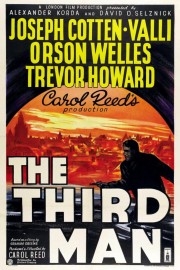The Third Man
Anton Karas’s zither sets the tone for “The Third Man.” Few film scores have ever been as important to the narrative of a film as Karas’s is. The sound is both chipper and melancholy, which makes sense as Holly Martins, the author played by Joseph Cotten, arrives at Vienna to visit with his best friend, Harry Lime, and finds that he has died mysteriously. As he goes through the world of Graeme Greene’s and Carol Reed’s film, we find that he is adrift in the world as he tries to put the pieces together about what happened to his friend. What he finds is that he wasn’t as innocent as he thought.
Movies like “The Third Man” create a vibe and feel to them, and we just find ourselves leaning into it. This is the sort of thing we’re accustomed to from, say, the Coen Brothers, and it’s no wonder they were inspired to do a riff on this film’s ending in their 1990 film, “Miller’s Crossing,” also about a protagonist who ends up betraying the friend he protected for a long time. Here, the soundtrack is what causes it, but Martins is also an intriguing protagonist. As played by Cotton, he is a world weary traveler into a city torn apart (literally; there are four countries that each run a part of it) by war. He isn’t looking to profit from misery, however; he just was hoping for a change of scenery. Being at the funeral of your friend who invited you shortly after you arrive will put a damper in it.
Martins becomes a detective as he is engrossed in the investigation into Harry Lime’s death. But there doesn’t feel like there’s a lot of urgency into the investigation. Martins seems to be exerting more interest in Lime’s death than the authorities are, even when it appears there are discrepancies in the story of his death. The title refers to the idea that a “third man” found Lime’s body, but one is not in the official record of the death. Eventually, we learn the horrible truth about Lime, and we meet the man himself, played by Orson Welles in arguably one of his greatest performances, and easily one of the most iconic entrances in movie history. The vibe of the film shifts entirely when Lime enters the equation. Once introduced, the story begins to resonate with a different sense of empathy for Martins. He’s been had by a con artist.
Reed choosing to shoot on location in Vienna, after WWII, is fundamental to the film’s success. The way he uses the bombed-out landscapes of the city; how he shoots with angles and deep black-and-white cinematography. The way he and Greene develop Anna Schmidt (Alida Valli), Harry’s girlfriend, who is sometimes as unsure of who Harry is as anyone. The supporting cast including Trevor Howard, Ernst Deutsch and Paul Hörbiger, among others. This film is a fascinating study in film noir tropes and ideas, but with a sense of reality that is unlike anything else in the genre. It’s no wonder it’s so beloved.










